Vest Pocket Kodak
The Vest Pocket Kodak cameras were a bestselling folding camera series of Eastman Kodak (Rochester), from 1912 to 1926.
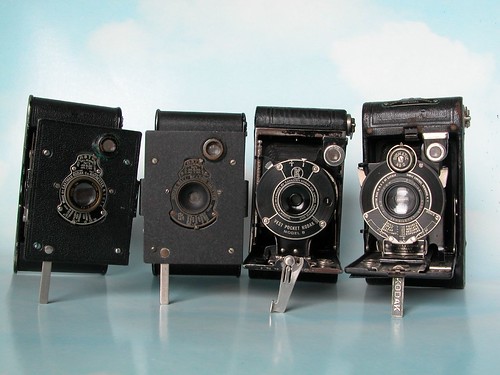
|
| models Vest Pocket Kodak Autographic Special, 1916-23, Vest Pocket Autographic Kodak, 1917-26, Vest Pocket Kodak model B, 1925-34, and Vest Pocket Kodak Special, 1926-35 |
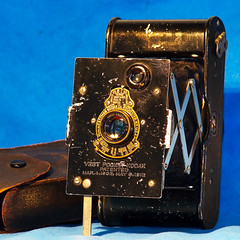
|
| Vest Pocket Kodak |
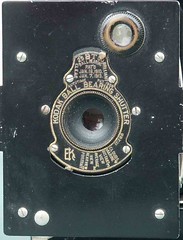
|
| Ball Bearing Shutter |
A strut folding variant had a f/6.8 72mm achromatic meniscus lens, hidden behind a mask that allowed a max. aperture f/11. It had to be loaded through the top with both film spools at once. It had the small three-blade variant of Kodak's Ball Bearing Shutter. Folded it was really handsome, not bigger than most modern compact cameras.
The Vest Pocket Autographic Kodak was a version advertised as "Soldier's camera" during WWI. It was manufactured from 1915 to 1926, sold 1,750,000 times. It was also of the compact strut folding type, but it had a Kodak Anastigmat f/7.7 lens. Its camera back had an area through which notes could be written onto the paper backing of the 127 film, the "autographic" feature invented by Henry J. Gaisman. Another variant had an f/8 lens, being marginally slower than the f/7.7 lens. Vest Pocket Autographic Special models were equipped with selected lenses of Kodak, Zeiss, Ross, Berthiot or Cooke.

|

|

|

|

|

|
| Model B, autographic variant |
The Vest Pocket Kodak Model B was a completely other camera, a primitive folding bed camera for making 4.5×6cm exposures on 127 film. Its lens was a doublet in a rotary shutter, or a Kodak Periscopic lens in a Kodak shutter. It had to be loaded through the front side, after removing the whole bed'n bellows unit. It was produced from 1925 to 1934 and cost $7.50. The version Vest Pocket Autographic Kodak Model B had the "autographic" feature.
"Hawk-Eye" versions of the Vest Pocket Kodaks were premium models, and the "Special" models had more sophisticated lens/shutter combinations.
A special Vest Pocket wooden development tank for the type 127 rollfilm was available from Kodak, as well as a special Vest Pocket enlarging camera.
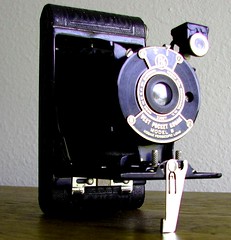
|
| Vest Pocket Kodak, Model B |
Links
- Kodak manuals on Mischa Koning's site [1]
- manual at Michael Butkus' [2]
- Model B manual at Michael Butkus' [3]
- Vest Pocket Kodak
- Vest Pocket Autographic Kodak
- Vest Pocket Kodak Autographic Special
- Vest Pocket Kodak Model B
- Vest Pocket Autographic and Crystal Japan at www.collection-appareils.fr
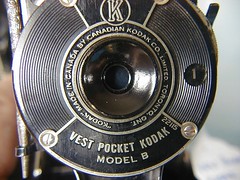
|
| the rotary shutter of Model B |
- Vest Pocket B at www.collection-appareils.fr
- Vest pocket serie III at www.collection-appareils.fr
- Vest pocket manual
- Vest pocket autographic manual